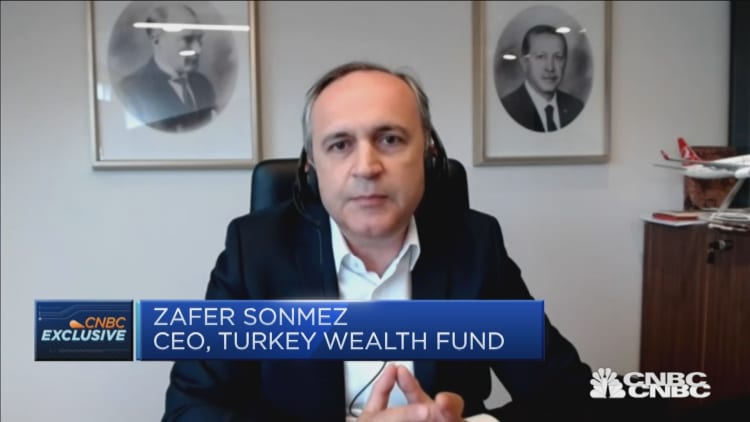
Sovereign wealth funds have a role to play in supporting countries' private sectors during a crisis like the coronavirus pandemic, the head of Turkey's wealth fund believes.
"I believe that (in the) post-Covid environment, we will see more activity from the sovereign funds," Zafer Sonmez, the fund's CEO, told CNBC's Hadley Gamble on Thursday ahead of Turkey's central bank decision to lower its interest rate.
The economy of 82 million, like most of the world, has been dealt a hammer blow by the coronavirus pandemic. For Sonmez, it's an opportunity for his fund — the country's strategic investment arm founded in 2016 — to play an important part in Turkey's coronavirus response.
"In terms of debt, the equity response should come from the sovereign wealth funds," Sonmez said, noting that Turkey's government debt-to-GDP ratio is a "relatively low figure" — some 32.5%, meaning it has room for further leverage.
"In my view, in the next three to five years, sovereign-owned entities and sovereign funds will play an important role in the equity part of the game." The Turkish Wealth Fund (TWF) has roughly $33 billion in assets, considered small compared to behemoth funds like those of Norway, China, Abu Dhabi or Kuwait. Before the pandemic hit, it had the ambitious goal of tripling that to $100 billion by 2023.
This trend is already alive and well in the Middle East's Gulf states, where some of the planet's largest wealth funds inject billions into local investments alongside increasingly adventurous foreign purchases. Amid the double shock of the pandemic and low oil prices hitting the region, the International Monetary Fund has called on state leaders to use their wealth funds to help boost growth.
"Sovereign wealth funds can play a role, regional institutions can play a role," the fund's Middle East and Central Asia director, Jihad Azour, said during an online conference in late April. For Sonmez, this is overdue in Turkey.
"When we look into Turkey, this kind of a platform was lacking in the economy. And we are a newly established fund," Sonmez said. "This is new for Turkey, but we will be more active, we will offset these volatile periods to help as an equity solutions provider of the sovereign."
Turkey has recorded the highest number of coronavirus cases in the Middle East region, with nearly 150,000 cases, having surpassed Iran in mid-April. But its economy was already under pressure before the coronavirus hit, with two years of a continuously weakening currency, a high fiscal deficit and unemployment at more than 14%.
The country's government in late March unveiled a $15.4 billion stimulus plan to aid businesses being hit hard by the pandemic, particularly those in the tourism sector, which is expected to see devastating losses this year. The TWF injected 21 billion lira ($3 billion) into three state banks earlier this month to bolster their capital positions and cushion the effect of the pandemic.
The country's parliament in late April approved a bill allowing the TWF to buy or become a partner in distressed companies hit by the coronavirus outbreak. Sonmez said this will prevent capital outflow from the companies, and enable the TWF to acquire controlling stakes in strategic firms. It also exempts the fund from certain regulations on private sector investments.
"So if we share control, we get some approval from the parliament for shortcutting the capital markets law and Turkish commercial law for becoming shareholders in the companies that are facing equity problems, that are facing cash flow problems," he explained. "Therefore, what we designed is to position the Turkey Wealth Fund as a core crucial and core part of the strategy for the Covid response package in terms of equity."


